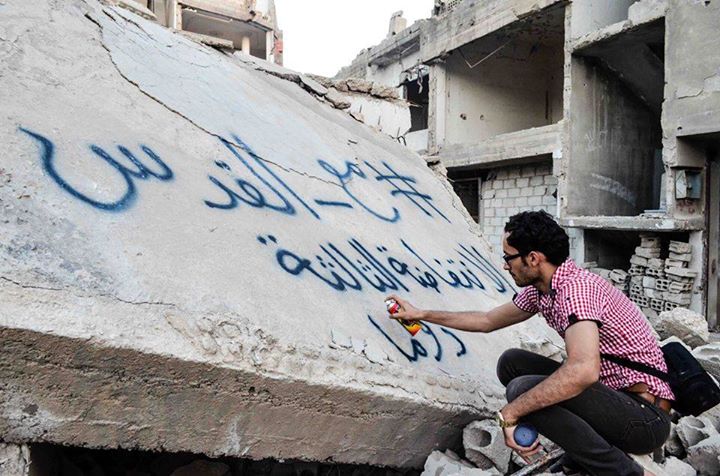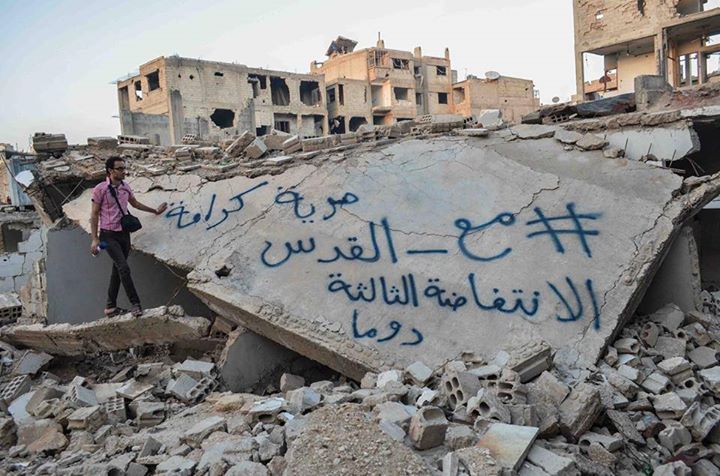Like many other Syrian youth, Yousef al-Bustani has always dreamt of a liberated Palestine. The young man is a resident of Douma, a town in the Damascus suburbs that has been besieged for well over a year. Since the Syrian revolution, however, al-Bustani’s dreams consist of more than just the dismantling of Israel, “the demise of Assad, and the demise of Israel… and most of the other governments too,” he told us.
Al-Bustani, a 24 year old, appears more serious than most of his peers. He currently writes for a number of revolutionary newspapers and media outlets, mostly about Palestinian affairs and acts as a representative for the local Revolutionary councils. Due to his revolutionary activities and speech, he was unable to continue his education at the University of Damascus, where he was studying architecture.
Before the Revolution, he dedicated his life to the Palestinian cause and used to keep track of all resistance movements and actions against the Israeli occupation forces. He told us that he used to, “feel proud that there were people who stood against the occupying forces and when I watched those in Europe and the other Arab countries, speak out for the truth, I would feel proud also… And when I would see the youth stand in front of the tanks and resist with stones, I would be proud.”
Yousef attributes his dedication to the Palestinian cause to the pan-Arab environment he grew up with at home. His father, before the revolution, taught him about politics and used to talk to him about what the Palestinians have endured for decades, not just in the occupied territories, but in Jordan, Syria, and Lebanon as well. Yousef is not alone in his politicized upbringing; many of Syria’s youth feel, and felt, this way. This can be attributed to two reasons: the pan-Arab environment and the insistence of supporting the Palestinian cause at the national level, and the preoccupation of their parents and the older generations with the resistance against Israel, which also occupies a part of Syria, the Golan Heights.
“I now feel as the Palestinians felt, 60 years ago, when the Arab governments abandoned them or used them as though they were a cheap commodity. And now, we Syrians, are like the Palestinians 60 years ago, let down by everyone near and far… They have lamented the world and its inaction, and now we do too,” he told us.

A old Arab adage states “pain and grief are what unite strangers, so what does pain do to those who are kin?” and this is a sentiment that is deeply shared by Yousef. “I’m certain that we and the Palestinians are one, because Israel is protecting Assad, and supporting the fragmentation of the region. Without Israel, it is unlikely that the Syrian regime would have pursued the fracturing and fragmentation of Syria. Every day, the Arab nation bleeds and the reason for that is the Zionist entity.”
Douma’s activists have paid close attention to the Third Intifada in Palestine. Every new development of the siege they currently live under serves as a reminder of what the Palestinians are going through, and they use these reminders as a way to create actions to stand in solidarity with the Palestinians.
Asides from Yousef’s revolutionary graffiti, an activist in the local councils had even suggested a nation-wide day to stand in solidarity with Palestine, and reiterate their demands for freedom and dignity, not just for themselves but for Palestinians too.

In spite of the siege and the deaths that haunt Yousef and his besieged friends in Douma, their belief that the Palestinian cause will be strengthen by the fall of Assad gives them strength. It is their belief that despite their posturing, the regimes in the region are more than friendly with Israel, and that their fates are not tied to the Palestinian cause.
The youths' dedication to the Palestinian cause is awe-inspiring: it is inspiring and amazing to see that despite the regime’s brutality, there are thosae who want to show their solidarity with those also suffering from oppression. Palestinians continue resisting and living in spite of the Israeli occupation, and so do Syrians despite the regime’s brutality, as the struggle, ultimately, is one against all oppressions.



